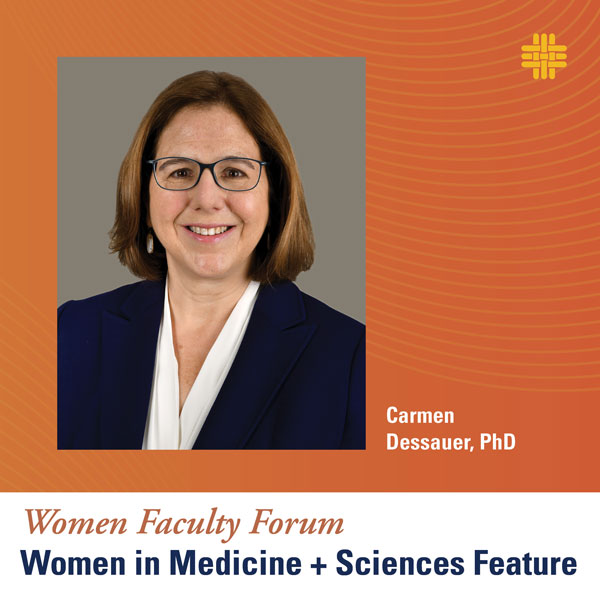Women in Medicine and Sciences Feature: Carmen Dessauer, PhD

Each month, the Women Faculty Forum presents its Women in Medicine and Sciences Feature, highlighting the women faculty at McGovern Medical School who are leaders in medicine, research, and education.
This month’s feature is Carmen Dessauer, PhD, professor, chair, and John P. and Kathrine G. McGovern Distinguished Chair in the Department of Integrative Biology and Pharmacology.
What is your background? When did you join UTHealth Houston?
I was born and raised in New Orleans on the east side of town, nestled between Lake Pontchartrain and the MRGO Bayou. Although my family had moved across the lake to Mandeville, La., by the time Hurricane Katrina hit, this area was extremely hard hit by flooding when the levees failed during the storm.
I attended college at Louisiana State University and, in my senior year, married the love of my life. I made the decision to stay at LSU for my graduate work to help support my husband’s business in New Orleans. When it came time for postdoctoral work, we moved to Dallas so that I could work with Alfred Gilman at UT Southwestern Medical Center.
Gilman won the Nobel Prize in medicine shortly after I arrived, and my time in his lab was a blur of sleepless nights in the lab, one exciting discovery after another, and connections with other postdocs and students that have lasted a lifetime.
What inspired you to pursue a career in science?
I honestly cannot remember a time when I did not love science. What pushed me into a PhD track was my freshman research project at LSU. As part of my Presidential Scholarship, I was given a paid position in a research lab.
I worked for Dr. Roger Laine in the biochemistry department, whose first assignment for me was to clean and refurbish his Finnigan triple quad mass spectrometer. So here I was as a freshman, taking apart a very expensive instrument, numbering each piece, and laying them out on a sheet on the floor. I cleaned it and put it back together in reverse order and to my ultimate surprise, the instrument worked, and we obtained usable data. From that point on, any thoughts of pursuing an MD went out the window – I was hooked on research.
What are the primary research interests that drove your career, and what are you pursuing now?
I have always loved studying the molecular mechanisms of how proteins and enzymes work. My postdoctoral research focused on the biochemical and structural characterization of the enzyme adenylyl cyclase, which produces the second messenger cyclic AMP (cAMP). Although we are still involved in structural studies, most of the lab strives to understand the hormonal regulation of cAMP signaling in physiological and pathophysiological states, particularly with respect to both cardiac arrhythmias and chronic pain.
My laboratory provided some of the first evidence for spatial and temporal specificity of cAMP production, identifying novel scaffolding proteins that give rise to subcellular organization of cyclic nucleotide signaling pathways. We are currently pursuing pharmacological ways to target these complexes that are often disorganized in disease states.
Who are your role models?
During my postdoctoral training, I was lucky to have Alfred Gilman as a great scientific mentor who always seemed to know the most important questions to ask. However, it was Melanie Cobb, a National Academy of Sciences member and fantastic scientist in her own right, who taught me how to balance research and family. Her words of advice and encouragement have stayed with me throughout my career.
At UTHealth Houston, I have been mentored and inspired by so many accomplished women faculty, including Agi Schonbrunn, Barbara Sanborn, and Dianna Milewicz, to name a few.
What do you enjoy most about working at UTHealth Houston?
Without question, what I love most about UTHealth Houston are the people that I get to engage with every day. An “open door policy” is truly embraced in our department. I have found this to be an incredibly supportive and collaborative environment throughout my career and love the opportunity to mentor the next generation of scientists.
How do you think UTHealth Houston can further support female faculty?
As women, it is exceedingly difficult to maintain a health work-life balance. Therefore, it is vital that the university, and particularly the NIH, recognize the fundamental law of thermodynamics: energy can neither be created nor destroyed – only converted from one form to another.
If applied to faculty life, it means that we have only so much energy to dedicate to work. Thus, for every new administrative burden, no matter how seemingly small, something must be sacrificed. If we are unwilling to sacrifice our own mental well-being or research/patients, then as a research and medical community we must demand that for every new administrative burden, another is removed.
It is certainly my hope that this will be recognized across the spectrum of rules from the NIH and our institution that are constantly evolving.
If you would like to nominate a faculty member for the Women in Medicine and Sciences Feature, click here.